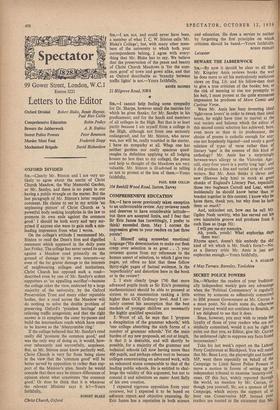COMPREHENSIVE EDUCATION
Sitt,—I have never previously taken exception to an unfavourable review. Any reviewer needs and deserves to have considerable latitude— but there are accepted limits, and I fear that Sir Eric. James has (unwittingly, I prefer to think) exceeded them. May I correct the impression given to your readers on just three points.?
1. Himself using somewhat emotional language ('His determination to make our flesh creep over selection is so great . . .') your reviewer quotes from my references to the human aspect of selection, to which I give two pages, yet offers no hint that these follow thirty-eight pages of factual evidence. Is the 'superficiality' and distortion here in the book or in the review?
2. I state clearly (page 174) that more advanced pupils (such as Sir Eric's promising mathematician) should be able to proceed at sixteen to an examination ranking a little higher than GCE Ordinary level. And I cer- tainly contest his assumption that the best teachers of younger children are necessarily the highly qualified specialists.
3. Worst of all, he says that I 'propose a decapitation of the grammar schools,' with 'one college absorbing the sixth forms of a number of grammar schools.' Yet the main burden of my new proposals, set out at length, is that it is desirable, and will shortly be possible, for a majority of the grammar and technical schools (all now having more than 400 pupils, and perhaps others too) to become colleges concentrating on advanced work, with an enhanced status comparable to that of the leading public schools. He is entitled to chal- lenge the validity of this argument, but not to conceal it and substitute an easier Aunt Sally of his own creation.
I expected vigorous opposition from your reviewer, but I expected it to be based on accurate report and objective reasoning. Sir Eric James has a reputation in both science and education. He does a service to neither by forgetting the first principles on which criticism should be based.—Yours faithfully,










































 Previous page
Previous page